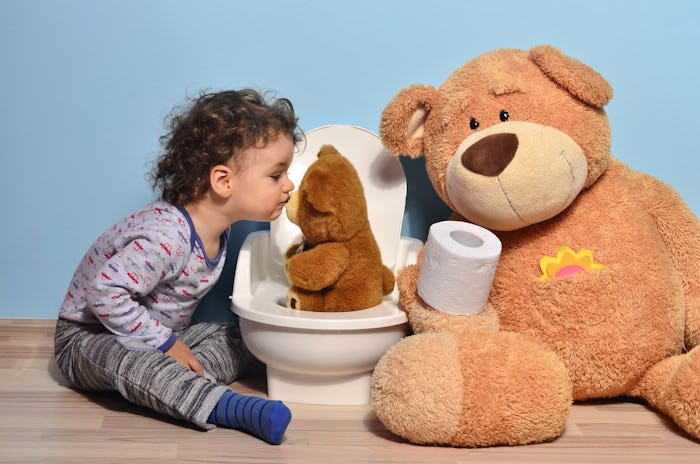Life

7 Times You Need To Pay Attention To Your Kid's Potty Training Accidents
Any parent with a kid older than two can tell you about the joys of potty training. And by "joys," of course, I mean "horrors." There are bound to be accidents, occasional regressions, and other hiccups as your kid adjusts to this new level of self-awareness and self-regulation, but what happens when things seem to go beyond what might be defined as "normal"? Your kid's potty training accidents may, in fact, be a message worthy of your undivided attention and potential further action, and it's up to you, as their parent, to decipher it.
While I don't have any medical training, I do have a lot of experience on this topic. In fact, I won't lie; this is hard for me to write about, but I feel it's so important to discuss with parents so I'm finally ready, willing and able to talk about it openly. I spent most of the first 10 years of my life dealing with accidents. My parents had no clue what was going on with me, and neither did I. The shame I endured, the overwhelming feeling of being broken, of wondering whether I was being judged or ridiculed, are all something I continue to deal with, decades later. It turned out that I had a bladder disorder that went undiagnosed until I was 10 years old, but eventually I did receive treatment thanks to some rather incredible doctors. Still, it all came at a price.
Fast forward a few decades and here I am, dealing with my own kid's challenges with potty training. We're trying to determine why she's having so many problems, but it's hard. Despite my own experiences, and my promises to myself that I would never react negatively to any problems my own kids had with toilet training, it's still hard. Sometimes, even letting out a big sigh of exasperation after the fourth accident that day, can come across as anger to your kid.
So, if your child is having accidents and you're losing your patience, I implore you to start researching the possibilities. It might be nothing but, if it isn't, it's worth getting to the bottom of the problem sooner rather than later.
When There's A Major Change In Routine
As someone who abhors routine, especially when it comes to my kids, I'm here to tell you that most children thrive on it. Especially when they're learning new things. My daughter had a major regression, once summer hit and all the designated times she was used to trying to go pee disappeared.
When They Tell You They Can't Feel When They Have To Go
While potty training is something every kid will learn to do eventually, there is a very small percentage of children who have physiological reasons for their accidents. Meaning, they may need to be seen by a doctor for further testing and diagnosis.
When They Are Sick
When my daughter is starting to come down with something, the first thing that goes is her bladder control. If there's a urinary tract infection, problems with bladder control can be even more pronounced. You can ask if it hurts when they pee, or if they're having trouble peeing, and follow up with your doctor if the answer to any of those questions is a "yes."
When There's A Major Change In Their Life
At the beginning of this past summer, we moved to a new city and everything went to hell. My daughter changed schools and the different routine she's having to adjust to, as well as new classmates and teachers, has thrown her for a serious loop. A new sibling, divorce, losing a grandparent or beloved pet – all of these changes can affect progress with potty training, or cause a regression.
When They Lie About Having (Or Not Having) Accidents
As someone who had problems and dealt with the shame of those problems, as a kid, (I was one of the very small percentage of children who needed medication to deal with incontinence), the shame associated with having accidents is very real, and if your child is lying about them, it's time to check yourself and make sure you aren't contributing to any shame they may be feeling.
When There Are Other Behavioral Problems
If your kid is acting out in other ways, there may be more to their accidents. Have any caregivers changed? Is there a reason your child may be upset? They may be trying to tell you something's up, without using actual words.
When You Find Yourself Getting Angry At Your Kid For Their Accidents
This. Is. So. Hard. When you're taking your kid to get changed for the sixth time in one day, or you send them to kindergarten with three changes of clothes, and they still come home wearing someone else's outfit; who wouldn't be frustrated? As I said before, though, you really need to check yourself and find ways to stay cool, calm and collected. I speak from experience – even when you're reacting negatively out of ignorance, it is going to affect your child. My parents didn't know I had a physiological bladder disorder for the first 10 years of my life, so you can imagine how frustrated they must have been, seeing my accidents persist well past the potty training years. They weren't horrible parents by any stretch, but the shame I felt for not being able to do something every other kid had no problem doing has had an incredibly far-reaching impact on me. Despite my own experiences, there are times I want to scream in frustration at my own kid's persistent accidents.
Your child needs your love, especially when it comes to figuring out why the accidents are happening. Your child needs your compassion. With those tools, hopefully you can get to the bottom of any incontinence problems your child may or may not be having.